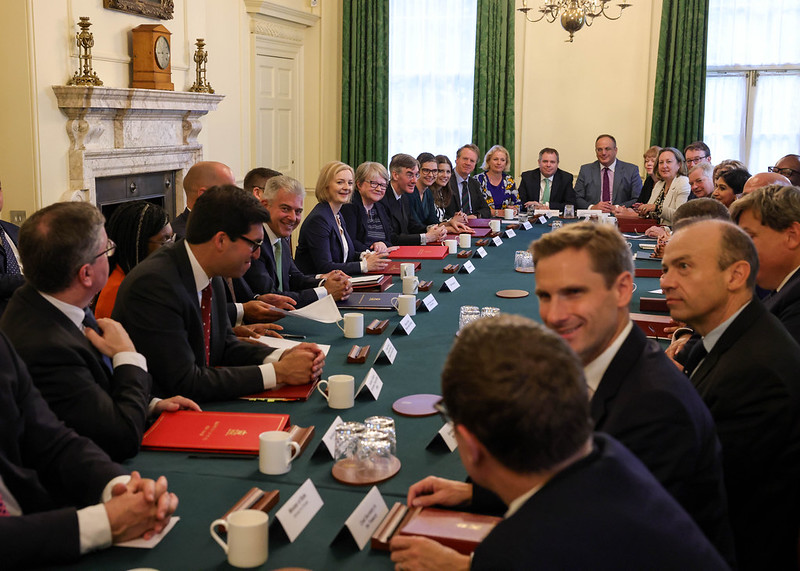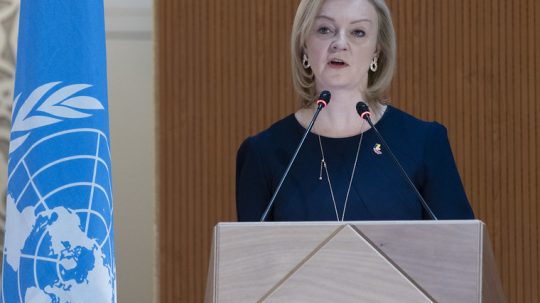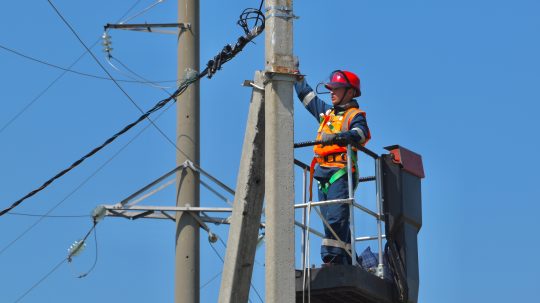The pound fell to its lowest level against the dollar in history on Monday 26 September, following the ‘mini-budget’ from Chancellor Kwasi Kwarteng on Friday 23 September, in which he outlined sweeping tax cuts for the wealthiest people in the UK. The International Monetary Fund (IMF) criticised the UK government for its mini-budget, which it said would “likely increase inequality”, and called on it to rethink its plans to give tax cuts to high earners.
The plummeting pound, against a backdrop of the highest inflation in decades, means that people’s economic and social rights – from the right to housing, through the right to healthcare, to the right to social security – could be at greater risk. Under Article 11 of the International Covenant on Economic, Social and Cultural Rights (ICESCR), everyone has the right to an adequate standard of living. So, how could the weakened pound impact people’s rights in the UK?
Price rises
The pound plunging means that it costs the UK more to import goods – like food, raw materials and energy – from other countries.
Given the UK imports half of its food, the price of groceries, from fruit and vegetables to pasta, is likely to rise. Prices for goods in the UK had already risen by a record 10.6 per cent this month, partly as a result of Russia’s invasion of Ukraine, which has caused higher prices for fertilisers. These developments will “lengthen” the existing cost-of-living crisis, thinktank the Institute for Public Policy Research has said.
Energy costs, which had already risen to record levels, could further increase. Gas and oil are priced in dollars, making them more expensive when the pound is weak against the dollar. Though the government’s energy price cap should cushion consumers from the worst of gas price rises, the spiralling cost of petrol could see drivers spending £3 more to fill up the tank.
Mortgages and rents more expensive
Fears that the Bank of England would announce an emergency interest rate rise in response to the government’s tax cuts caused lenders to withdraw hundreds of mortgage products from their offering on 27 September.
Huw Pill, the Bank of England’s chief economist, said that the Bank would deliver a “significant policy response”, but it would likely wait until its expected announcement date on 3 November.
If interest rates increase in November, people in the UK will face higher costs for paying back borrowed money, such as mortgages. Mortgage holders have already seen rising interest rates after the Bank increased rates earlier this month. But now, homeowners could see costs soar to a 30-year high, adding hundreds of pounds to their monthly mortgage payments.
Tenants’ rent, already rising year on year, is expected to shoot up as a result of these hikes to landlords’ mortgage costs. Young people renting, first-time buyers and the poorest households will be most affected by the higher rates, according to analysis from the Financial Times.
Cuts to public services and social security
Tax cuts for the highest earners are to be paid for by borrowing more money, the Chancellor said. Borrowing will reach its third highest level since the Second World War, according to the Institute for Fiscal Studies (IFS). But the mini budget has caused UK gilt (government bonds) yields to jump, which means that the government will pay a higher cost for borrowing money to finance the tax cuts.
Given this, the price of gilts fell which put pension schemes that hold the bonds in danger of collapse. The Bank of England intervened in the market on 28 September, buying £65bn in gilts to save pension funds from insolvency and people from losing their pensions. The cost of the Bank’s emergency purchase will likely fall to the taxpayer.
Long-term UK borrowing costs soaring again today.
30-year gilt yield approaching 5%, doubling in less than two months.
Last Thursday it was below 4%.
A month ago it was below 3%. pic.twitter.com/vyAtSBkCDd
— Jamie McGeever (@ReutersJamie) September 27, 2022
To reduce the debt burden caused by tax cuts, experts have said the government may look to cut spending. Paul Johnson, the director of the IFS, has said that he expects Kwarteng to outline deep public spending cuts in his medium-term fiscal plan, to be published on 23 November.
Public spending cuts would likely have a significant impact on people in the UK’s access to health, social care and other vital services that are already struggling. Former Bank of England deputy governor, Sir Charlie Bean, told Sky News on Wednesday that if the government continues with its plan, the scale of cuts to public spending could amount to ending the NHS.
Cuts to public spending might also take the form of reductions in the welfare benefits to which people are entitled, hitting some of the least well-off hardest. Treasury secretary Chris Philp refused on 28 September to confirm that a promised rise in benefits to offset inflation would still happen next April.
The UK is already facing a “standard of living crisis”, thinktank the New Economics Foundation said earlier this year. Analysis from the Resolution Foundation showed the average household in the UK is £8,000 worse off a year than households in France, Germany, Australia, Canada and the Netherlands. Rising prices for petrol, housing and food, coupled with scaled-back public services, will likely worsen the standard of living for the majority of people in the UK.





